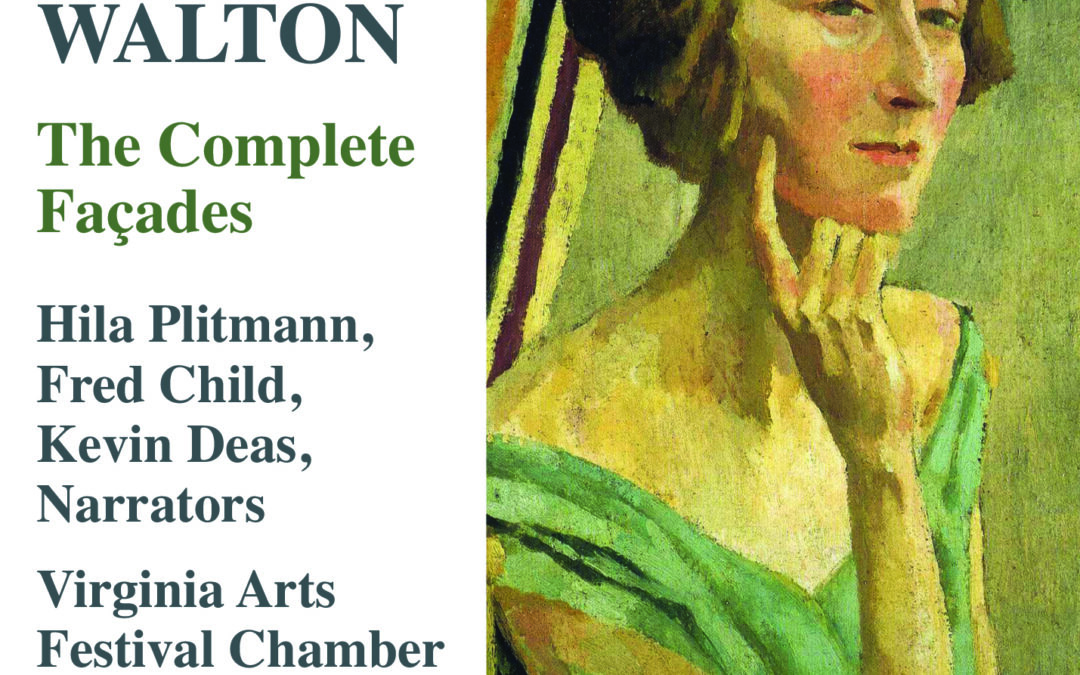Virginia Arts Festival Chamber Orchestra
“William Walton: The Complete Façades”
(Naxos)
“Façade” is the original title of quirky, witty poetry of Edith Sitwell read to the music of William Walton. This Naxos label CD, recorded at Virginia Wesleyan in 2021, features an all star cast of narrators with instrumental accompaniment by the Virginia Arts Festival Chamber Orchestra (or Chamber Players) under the baton of JoAnn Falletta.
Not only are recordings of “Façade,” the century old erudite and ever so very British precursor of “spoken word” performances and rap as well, about as easily found as the dentition of barnyard fowl, but this locally performed and recorded version features the world’s first-ever recordings of 12 verses that Sitwell added to the work, a dozen years after its 1922 premiere. Eight of those are in a segment titled “Façade 2 – A Further Entertainment” and four more in “Façade – Additional Numbers.” (Hence, the “Complete” part and plural form of its title.)
The poetry, while rich with mythological, Biblical and literary references and larded with allusions to Sitwell’s friends and family, focus more on sound more than on sense. At various times, Beelzebub calls for his syllabub, “leafage” rhymes with “grief age” and some Hispanic named flirts “take mantillas, capes / Hiding their simian shapes.” Pronounced rhythms shift into brief moments of something like but not quite prose.
A rousing opening hornpipe nautical patter song is followed by a deceptively gentle intro to a poem titled “En Famille” about someone’s admiral father, which suddenly finds its listeners on “the street of Hell / watching siesta shutters that fell.”
A languorous tune begins “long steel grass – / The white soldiers pass” and then turns forceful. Throughout the reading the narrators – Performance Today radio host Fred Child, baritone Kevin Deas and soprano Hila Plitmann – hasten or prolong their words as the music dictates.
The music of a 20-year-old Walton leaps, soars, threatens, and rushes along with Sitwell’s pedal-to-the-metal flow of rhymes, alliteration, assonance and sheer joy in the sound of the English language.
The CD does come with the text of the poems, but following along with the reading really ought to be left for a second or third listening. Sitwell’s vocabulary did send this writer on several occasions scurrying to an unabridged dictionary.
A wild, and perhaps random alternation of tempi is a hallmark of music and readings alike, and there simply no way to fully grasp the work without more than one hearing. The effort of careful listening is more than rewarded by Sitwell’s quirky sense of humor and the sense that behind her facade of fast paced, lighthearted and almost certainly conscious, even contrived eccentricity of word-play lies a similarly turbulent psyche of an artist who could still thoroughly enjoy not taking herself seriously. (There’s probably a PhD dissertation, or at least an undergrad senior thesis lurking here, either in literature or psychology.)
Sitwell was born in the reign of Queen Victoria and lived to see Elizabeth II reign for a dozen years. She was the eldest child and only daughter of an aloof Baronet and his rage prone wife, the maternal granddaughter of an Earl and the great granddaughter of a Duke. It’s easy to see her determined rebellion against traditional verse forms as a wholesale rejection of the emotionally sterile formality of her distant parentage. Alternatively, one can just let the sounds of her verbal outpourings wash over one with peaks of comprehension and, inevitably, of sympathy for and delighted fascination with this author, so clearly brilliant and remarkably articulate in her own, truly unique way.
Most importantly, Sitwell and Walton had fun with “Façade,” and the listener should do the same. — Montague Gammon III




